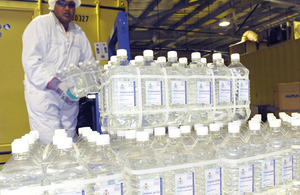Supplying troops in Helmand with water
At Camp Bastion's MOD-owned water bottling plant, civilian contractors supply UK and other ISAF forces across Helmand with clean drinking water - sourced from the desert. Report by Ian Carr.

48,000 litres of water are bottled every day [Picture: Corporal Lynny Cash, Crown Copyright/MOD 2010]
If you are ever wandering around the baked, bone-dry desert base that is Camp Bastion, you could be forgiven for rubbing your eyes in disbelief if you suddenly stumble across what looks suspiciously like a water bottling plant.
No, it’s not a mirage. Beneath your dusty boots, 150 metres down through hard coral strata, flow tens of thousands of litres of drinking water, fresh from the snow-capped mountains of the Hindu Kush.
And every day, from four boreholes, 48,000 litres of that water are pumped to the surface to quench coalition forces’ thirsts at Bastion and the forward operating bases as well:
In fact we draw up roughly 100,000 litres a day, but only 40 per cent of that goes through the full treatment process,” said plant manager Colin Howell who has been running the wholly MOD-owned plant since 2007.
The rest is used for things such as dust suppressant and keeping the fire brigade topped up.
Being able to provide potable water in this way saves the MOD the cost of transporting it in, and ensures there is a safe, steady supply, literally on tap, as well as in the unmistakable square-shaped Bastion bottles, which are also produced at the plant.
The empty bottles arrive as pallet-loads of preforms, tiny plastic test-tube-shaped containers.
These are placed into a mould and air is blasted into them at 84 degrees C, pumping them up to their one-litre size. This too saves transport costs:
From one pallet-load of preforms we can make 11 pallets of full-sized bottles,” said Colin.
I reckon that since 2007 that has saved the MOD having to pay for around 5,000 truck load deliveries. Add in the cost of security for deliveries, and that’s quite a saving.
Like the plant, the bottles and their labels were specifically designed to meet military requirements demanded by the Permanent Joint Headquarters.
They are tougher than commercially available bottles, increasing the shelf-life of the water to two years - in an ordinary bottle the water would only last for 12 months, or probably less if exposed to the sort of baking and bashing a Bastion bottle has to put up with:
We left a pallet outside for two years then sent samples to the Institute of Naval Medicine in Gosport for testing, and it was fine,” said Colin.
As well as lasting longer in harsh conditions, the more robust bottles can be air-dropped without giving those on the ground an impromptu shower.
The bottles are square so they don’t roll around and so they fit into troops’ webbing. Some soldiers say they would prefer smaller bottles:
We produce what MOD tells us to,” said Colin. “We could do any size or shape. We could produce landing craft shapes if you want.
The quality of the water is critical and standards within the bottling plant are high. Colin reckons that the filtration system is so good it could take out biological warfare contamination if absolutely necessary.
Every batch of water is tested in the purpose-built water-testing laboratory and each week samples are sent to the Institute of Naval Medicine for independent verification:
We’ve never recorded a failure, and we don’t expect to. Our water is compliant with the Natural Mineral Water, Spring Water and Bottled Water (England) Regulations 2007, and the Water Supply (Water Quality Regulations) 2000,” said Colin.
Normally the plant operates 24-hours-a-day, seven-days-a-week, with no shut downs for meal breaks or shift changeovers; there are two ten-hour shifts followed by a rigorous four-hour cleaning and maintenance routine:
We are at least as clean as the hospital,” said Colin proudly, “after all, the worst the hospital can do is kill all its patients - we could kill everyone on the whole base.
Colin believes Bastion bottled water compares favourably to anything you will find on a supermarket shelf. So could there be a commercial outlet for the product?
Absolutely not,” insists Colin, “we are not allowed to profit from Afghan-produced resources, and we are not geared up for that kind of production.
That may be, but it is not unheard of for a bottle to attract healthy bidding on eBay it seems.
This article is taken from the February 2011 issue of Defence Focus - the magazine for everyone in Defence.